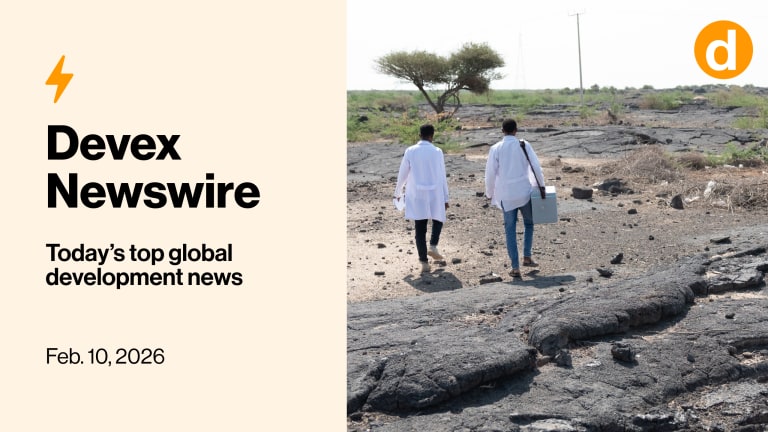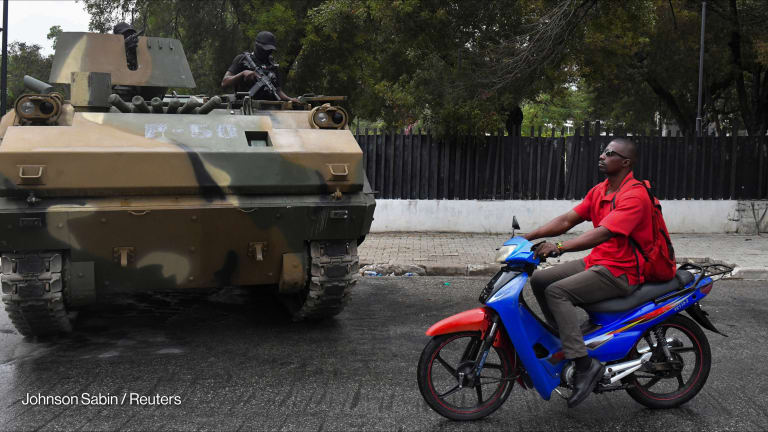Aid work in North Korea — 5 ways to stay safe and be effective
How can aid workers navigate a country notorious for detaining and expelling foreigners? Here are five tips to keep in mind.
Aid workers endure all kinds of dangerous conditions, but it’s the rare country that will accuse you of “bringing down the foundation of its single minded unity.” Reclusive North Korea has been in the headlines a lot recently. On Sunday, the country defied world leaders by launching a long-range rocket — an act widely regarded as an intercontinental missile test. And just over two weeks ago North Korea’s state-run media announced that the country had arrested 21-year-old American university student Otto Frederick Warmbier, accusing him of committing a “hostile act” against the state. The media report went on to allege Warmbier entered North Korea “under the guise of a tourist for the purpose of bringing down the foundation of its single minded unity at the tacit connivance of the U.S. government and under its manipulation.” North Korea’s headline-grabbing actions draw attention away from a threat aid workers in particular should be paying attention to — the country’s persistent malnutrition problem. Just days after Warmbier’s detention came to light, UNICEF called for $18 million in relief funds to help an estimated 25,000 children affected by severe and acute malnutrition. Drought in North Korea last year cut food production and reduced access to safe drinking water, according to the U.N. agency. Such a call for an international humanitarian response is not new. International aid workers have been in and out of North Korea since the mid-1990s — after flooding destroyed the country’s emergency grain reserves. But aid workers, like tourists, risk arrest or deportation if they don’t follow a set of strict guidelines, and they face unique challenges when trying to do their jobs. “North Korea is a difficult area to work in, in part because the North Koreans don’t make it easy,” Ambassador Robert King, U.S. special envoy for North Korean Human Rights Issues told Devex. “They are suspicious of particularly Americans, but [also] of most foreigners.” Tensions between Washington and Pyongyang have been high for years. U.S. media reported last year that the Pentagon secretly funded an American NGO working in North Korea — whose CEO acted as a spy for the U.S. military. And just last year, American aid worker Sandra Suh was deported from North Korea on charges of producing anti-state propaganda and using her status as a humanitarian worker as a cover. Also last year, the country director for German aid group Welthungerhilfe was expelled from North Korea, with no reason provided by state authorities. Given these risks then, how can aid workers stay safe, while at the same time responding to a critical humanitarian need? Here are five tips. 1. Anticipate and accept communication constraints. Foreigners in North Korea are prohibited from communicating with North Koreans via cell phone unless it is through official channels, according to King, who added that if a foreigner does get a cell phone, it will only allow him or her to communicate with other foreigners in the country. On top of that, Internet is “virtually not available,” the ambassador said. For aid workers and their humanitarian organizations, this can present a particularly burdensome logistical challenge. Coordinating with locals on the ground requires the help of North Korean minders who are assigned to escort foreigners, and might arrange visits and phone calls if allowed. “We have to announce our project visits,” Simone Pott, spokesperson for the German aid group Welthungerhilfe told Devex. Pott added that while Welthungerhilfe project managers in most countries live where the projects are, project managers in North Korea have to live in Pyongyang, which is not necessarily a convenient location for managing work miles away. In addition, aid groups working in North Korea such as Welthungerhilfe don’t have local colleagues or partner NGOs as they would in other countries, Pott said. The North Korean government is their only partner. So are there ways to work around these logistical constraints? “You’ll get yourself in trouble if you try,” King said. Aid groups are better off accepting limited communication avenues and preparing to work with the resources they have, such as their minders. And that brings us to tip number two. 2. Follow the rules. There are some very basic rules that every aid worker should follow when in North Korea. For one, do not comment on politics. “You do not criticize the government in North Korea,” King said. Welthungerhilfe takes great care to maintain its neutrality, and in the context of North Korea, “we don’t comment on the political situation there,” Pott said, adding that “if you want to work in North Korea, you have to follow that line.” Another rule to keep in mind is to avoid talking about religion or displaying your religion. For example, it is illegal even to have a Bible in North Korea, according to King. And if you’re ever in a bind and unsure if something you want to do is allowed, ask your North Korean minder, King emphasized. Still, any aid work in North Korea involves risk, as was demonstrated by the expulsion of Welthungerhilfe’s country director last year for an undetermined reason. “After that incident, we had very intensive discussions with the government,” Pott said, adding that those talks helped both sides to understand objectives and any potential conflicts of interest. 3. Build trust and “take the long view”. Strengthening relationships with North Korean counterparts is a critical part of getting work done, according to Keith Luse, executive director of The National Committee on North Korea, an NGO founded by the humanitarian organization Mercy Corps. “Aid [and] development workers going into North Korea need to take the long view,” Luse wrote to Devex in an email, adding that this process of building relationships can take a long time and requires energy, resources, patience and consistency. Luse also wrote that “aid workers within [North Korea] should be good listeners and careful about making commitments unless they can truly deliver.” Ambassador King echoed that message, stating, “it’s always important to be explicit and be clear in terms of what you’re able to do — what you’re willing to do — when you deal with North Koreans.” 4. Know your resources. In addition to North Korean minders, there are other resources that aid workers should know of when in the country and when preparing to enter the country. For American aid workers, for example, it is important to know that the Embassy of Sweden in Pyongyang represents U.S. interests. “The Swedes are what are referred to as our protecting power,” King said, adding that U.S. citizens traveling to North Korea should register both with the U.S. embassy in Beijing as well as the Swedish embassy in Pyongyang. In addition, aid workers should be aware of North Korean laws and American aid workers should monitor U.S. laws and regulations related to humanitarian engagements in North Korea, Luse said. The U.S. Department of Commerce website gives information about export license requirements for shipments of goods to North Korea, and the U.S. State Department website has travel guidelines. The National Committee for North Korea also has resources documenting U.S. policies toward North Korea. 5. Keep the people in mind. Raising money for the people of North Korea — one of the most heavily sanctioned countries — is not easy. Following the country’s recent claim that it tested a hydrogen bomb, and news that it launched a long-range rocket, governments around the globe are eyeing North Korea as a threat. Reports just this month revealed that North Korea is even launching balloons, which drift south over the territory of neighboring South Korea and drop used toilet paper, cigarette butts and tissues from the air. But as Pott of Welthungerhilfe emphasized, politics shouldn’t concern aid workers who work for the people of North Korea — the “small farmers,” the “poor widows” and families. “The people you work with, they are very fascinating,” Pott said, adding that most of her colleagues who have worked in the country report having had an interesting and rewarding experience helping those in need, despite the challenges. Devex Professional Membership means access to the latest buzz, innovations, and lifestyle tips for development, health, sustainability and humanitarian professionals like you. Our mission is to do more good for more people. If you think the right information can make a difference, we invite you to join us by making a small investment in Professional Membership.
Aid workers endure all kinds of dangerous conditions, but it’s the rare country that will accuse you of “bringing down the foundation of its single minded unity.”
Reclusive North Korea has been in the headlines a lot recently. On Sunday, the country defied world leaders by launching a long-range rocket — an act widely regarded as an intercontinental missile test. And just over two weeks ago North Korea’s state-run media announced that the country had arrested 21-year-old American university student Otto Frederick Warmbier, accusing him of committing a “hostile act” against the state.
The media report went on to allege Warmbier entered North Korea “under the guise of a tourist for the purpose of bringing down the foundation of its single minded unity at the tacit connivance of the U.S. government and under its manipulation.”
This story is forDevex Promembers
Unlock this story now with a 15-day free trial of Devex Pro.
With a Devex Pro subscription you'll get access to deeper analysis and exclusive insights from our reporters and analysts.
Start my free trialRequest a group subscription Printing articles to share with others is a breach of our terms and conditions and copyright policy. Please use the sharing options on the left side of the article. Devex Pro members may share up to 10 articles per month using the Pro share tool ( ).
Jeff is a former global development reporter for Devex. Based in Washington, D.C., he covers multilateral affairs, U.S. aid, and international development trends. He has worked with human rights organizations in both Senegal and the U.S., and prior to joining Devex worked as a production assistant at National Public Radio. He holds a master's degree in journalism from Columbia University and a bachelor’s degree in international relations and French from the University of Rochester.








